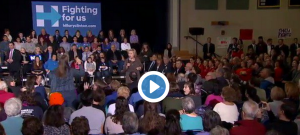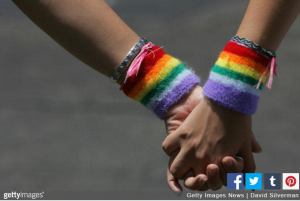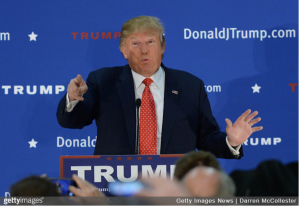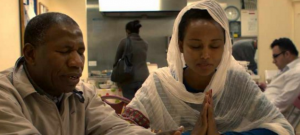Why do so many non-Muslims feel the need to opine so definitively on the nature (and virtue) of the Muslim faith? It’s almost comical to watch politicians tripping over themselves to praise Islam to the heavens when no doubt they’d flunk the most basic quiz regarding its history and beliefs. It’s even more comical to see the same (and sometimes even more effusive) praise from progressive Christians who at least theoretically believe that Islam — no matter how virtuous — has inferior truth claims to Christianity. On the other hand, there are conservatives who have described Islam with all manner of sweeping negative characterizations and make equally definitive (though ignorant) statements about Islam’s “true” character. If I had to sum up the difference in perspective, progressives tend to see jihadists as aberrational while many conservatives see jihadists as definitional.
But do we even have to define Islam? In the aftermath of 9/11, like many Americans, I rushed to learn more about the Muslim faith. That task gained additional urgency before my deployment to Iraq. I read the Koran, I read parts of the Hadith, and during my deployment I worked side-by-side with more Middle Eastern Muslims than most Americans will meet in an entire lifetime, yet in many ways I feel more ignorant about the nature of “true Islam” than I did before September 11. To precisely no one’s surprise, you can find Muslims with diametrically opposed views about many aspects of the faith, about the nature and applicability of Sharia, and about the role of Islam in civic and government life. In fact, these disputes spill over into violence with depressing and tragic regularity.
So, how can a Presbyterian lawyer know what Islam truly is if even Muslims don’t agree? In dealing with Islam, with the challenges of our war on terror, and with the sweeping characterizations from the right and left, I try to observe three basic principles of discussion:
First, we should leave the definition of authentic Islam to Muslims (and some scholars of Islam*). Simply put, not only do I not have the knowledge base to participate intelligently in that discussion, my opinion on the matter is utterly, completely irrelevant. Is there a Muslim in the whole universe who really cares about my interpretation of the Koran? Certainly I know there are theological and ideological differences within Islam, and I’m quite familiar with the debates most relevant to the war on terror and my own service, but how could I possibly adjudicate those disputes? Yes, I know quite a bit about the jihadist interpretation of Sharia law and its requirements, but how can I say those interpretations are right (or wrong) on the merits of the Muslim faith? I can’t. You can’t. And chances are, no one you know can, either.
*By “scholar of Islam,” I do not mean “person who read a few books/articles and knows a few Muslims”
Second, we should oppose jihad on every conceivable physical and ideological battlefront. Regardless of whether contemporary jihad represents an authentic expression of Islamic faith or it’s a grotesque perversion of a peaceful and peace-loving religion, it is still savage barbarism and must be opposed. While opposing jihad, we can’t labor under either hope-based delusions that its just the work of a “few extremists” or under the excessively cynical view that all Muslims are potential jihadists. After all, no one has suffered the effects of jihad more than Muslims– yet at the same time, there are too many hundreds of thousands of jihadists supported financially and morally by too many millions of Muslims for anyone to rationally believe that problems within Islam represent the work of the isolated few.
The same progressives who continually extol Islam’s virtues in spite of tens of thousands of terrorist attacks with hundreds of thousands of victims are often quick to demonize evangelicals conservatives on the basis of one or two “extremist” statements. Last year in National Review I wrote a piece that imagines America with a Christian terror problem on a similar scale as the terror problem in the Middle East. Perhaps this will speak a language you can understand:
Philadelphia, Pennsylvania — This morning marked a grim milestone in the fight against Christian terror in North America. Work crews cleaned up the remains of a suicide bomber and his victims after his self-detonation marked the 10,000th terrorist attack in ten years within the continental United States. The Camden, New Jersey–based Army of the Messiah immediately claimed responsibility. The bomber screamed the now-familiar “Praise Jesus!” just before he pressed the button, detonating his explosive vest while in a McDonald’s breakfast line.
At present, the United States government lists five states as “Crusader-dominated” in whole or in part. The Army of the Messiah rules New Jersey, the Knights Templar dominate Rhode Island, and the so-called “Crusader Regions” of mountainous Montana, Wyoming, Utah, and Colorado are utterly beyond federal control. In those regions, anti-blasphemy laws are enforced at rifle point, and Crusader militias have established training camps to support the California insurgency. These privately financed militias, supported through Texas oil money and supplemented by Baptist telethons, are believed to number in the tens of thousands and are also supported by the FBI as a counterweight to Mexican Catholicism.
In the meantime, hopes of a “Christian Spring” in Michigan were crushed when revolutionary Christian mobs attacked Muslims in Dearborn, and National Guard troops called in to keep the peace responded by crushing Muslim protestors beneath the wheels of their Humvees. Crusader parties were doing well in early polling in Ohio, Tennessee, and Kentucky, and in Florida a lonely protest marked the closing of the last synagogue — a once-thriving Jewish population having been completely expelled.
Overseas, the majority of the Christian diaspora is peaceful, but the Knights Templar are making significant inroads in British and French churches, and the Gulf States are still reeling from the destruction of the Burj Khalifa, formerly the world’s tallest building. Almost ten years after the coordinated truck bombing that took 3,000 lives and launched a decade of sustained combat, reconstruction is still not complete.
If those were the facts of Christian life, would any rational outside observer definitively declare that fears of Christian terror represented “Christophobia”? Simply put, we must oppose jihad — regardless of its extent or its relationship to “authentic” Islam.
Third, we should support and defend those Muslims who embrace liberty and stand against jihad. Even at this moment in history — when the Muslim Brotherhood triumphs in Egypt, embassies burn across the Middle East, and Sharia leads to brutal persecution and even executions of “apostates,” “blasphemers,” and non-believers — there are still brave Muslims who have not bent the knee to jihad. One of them, a 14 year-old-girl who spoke out for girls denied an education, was shot by the Taliban earlier this week. Another, a Muslim lawyer who bravely and successfully defended a Christian pastor in Iran, was just imprisoned by that totalitarian regime. In Iraq, I met many Muslims who died to stop jihad. Regardless of whether these individuals represent a tiny minority or an intimidated majority, Christians should stand with them. We should also understand the following: When we excuse or minimize jihad, we are excusing and minimizing the deadly persecution not just of Jews and Christians but also untold millions of Muslims.
As a final note, I yearn for the Middle East and the Muslim world — home to many of the world’s most oppressive regimes — to be opened to the Gospel. Until that day comes, however, we Christians can make the same declaration — with deeds and words — that so many of my brothers-in-arms did in Iraq: No human being, regardless of their religious belief, should be forced to live under the tyranny of violent jihad. Good men and women have died liberating Muslims from the oppression of their co-religionists. Those deaths were not in vain.










